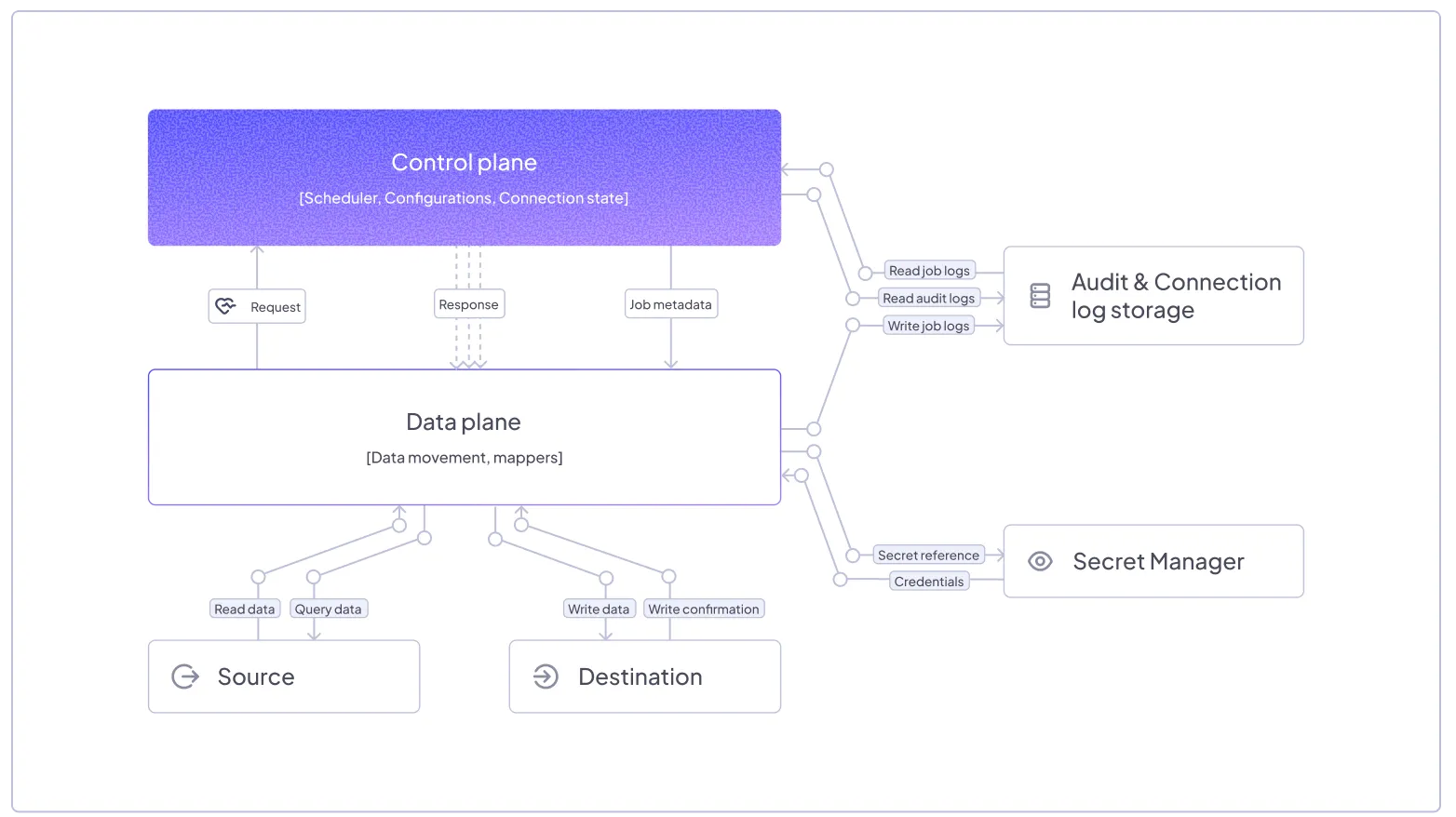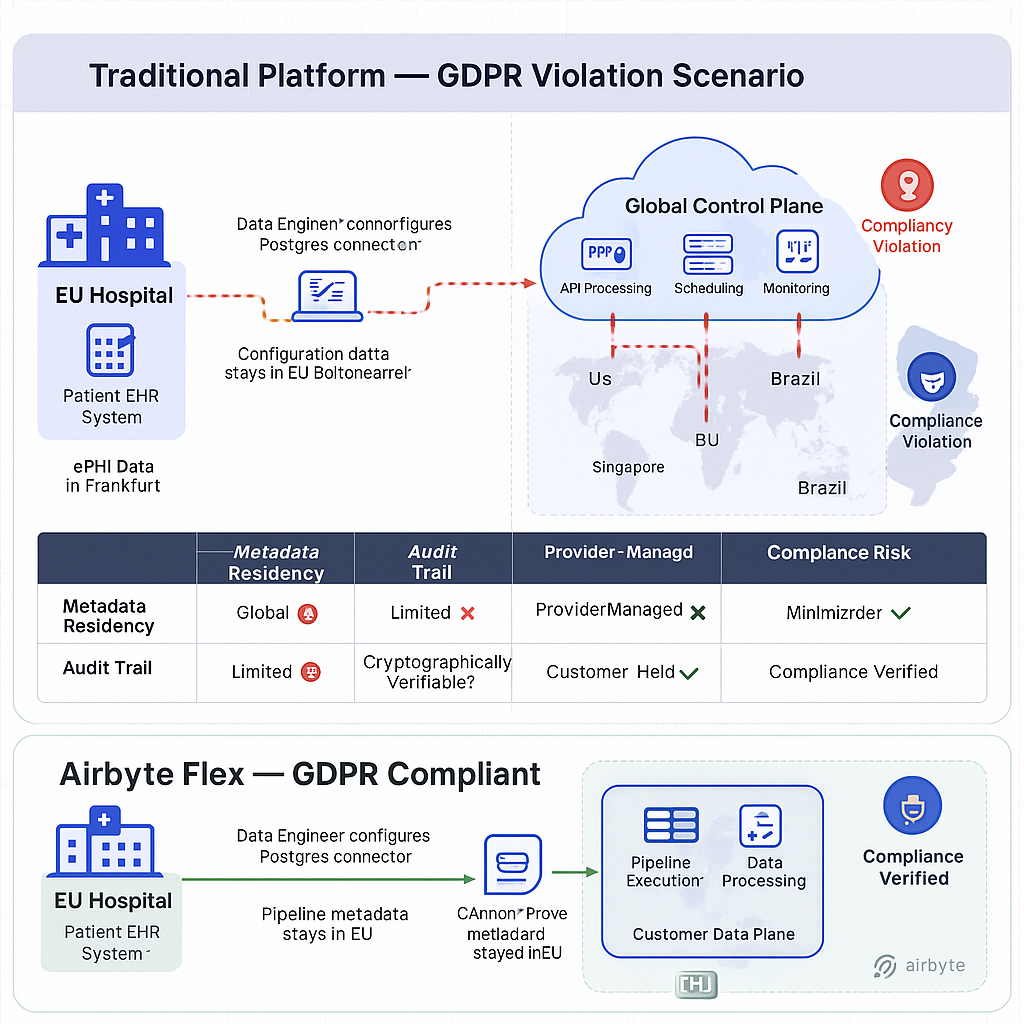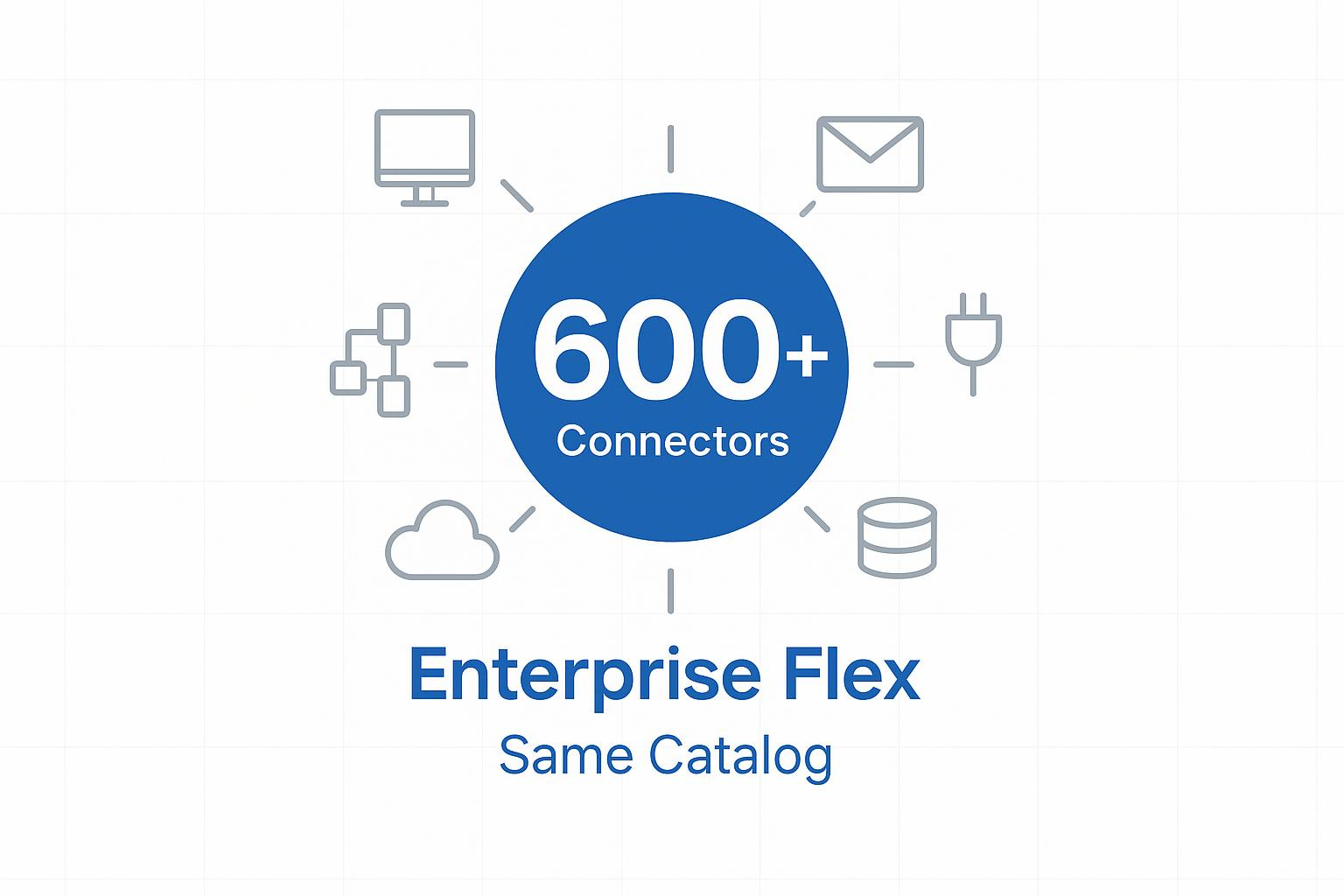Sovereign Data Integration: Why Airbyte Enterprise Flex Beats Traditional Cloud for Compliance-Heavy Industries
Summarize this article with:
✨ AI Generated Summary
Data teams at healthcare and financial services companies face an impossible choice: continue using expensive legacy ETL platforms that consume 40-50% of engineering resources on maintenance, or attempt cloud data integration that violates HIPAA, GDPR, and cross-border compliance requirements.
This structural problem affects every regulated industry. Healthcare teams need sub-minute clinical dashboards, but current HIPAA-compliant solutions lag 2-3 hours behind. Financial services require real-time fraud detection with under 30-second CDC replication, yet compliance teams insist raw transaction data never leaves regional data centers. Manufacturing organizations want SAP analytics in cloud warehouses, but exporting large tables locks production systems.
Airbyte Enterprise Flex eliminates this trade-off. Our hybrid control plane delivers cloud orchestration with customer-controlled data planes, giving you the full Airbyte catalog (600+ connectors) while maintaining complete data sovereignty. Unlike traditional cloud platforms that force metadata through foreign jurisdictions, Enterprise Flex keeps your data exactly where compliance requires while we manage the complexity.
Data teams report 60-80% infrastructure cost reduction compared to legacy platforms while maintaining sub-minute replication speeds and enterprise-grade security. This analysis shows exactly why sovereign data integration works and when the compliance benefits justify the investment.
What Makes Traditional Cloud Data Integration Risky for Regulated Industries?
Traditional public cloud data platforms create compliance violations through their architecture, not their security. Every data pipeline you create, like CDC streams from databases, API connections to SaaS tools, and file transfers to warehouses, generates control plane traffic that travels through globally managed infrastructure.
The compliance gaps show up in three critical areas that legacy audits miss.
Foreign Metadata Exposure
When you configure a Postgres connector or set up real-time Salesforce sync, that configuration data flows through the provider's global control plane. Under the US CLOUD Act, American companies can be compelled to hand over any data they "control", including your pipeline metadata. European regulators increasingly view this as a GDPR violation.
Cross-Border Pipeline Orchestration
Your healthcare data may stay in the Frankfurt region. Still, the scheduler that triggers your nightly ETL jobs, the monitoring system that tracks pipeline health, and the key management service that encrypts data all run on infrastructure spanning multiple countries with globally distributed staff.
Limited Pipeline Auditability
Compliance frameworks like HIPAA require complete audit trails for all data movement. Traditional clouds can't prove which administrators accessed your pipeline configurations, where automated data flows actually executed, or whether monitoring logs ever crossed jurisdictions.
Healthcare organizations discover this gap when HIPAA auditors ask for proof that ePHI metadata never left their controlled environment. Banks face similar scrutiny under GDPR when regulators demand evidence that transaction pipeline logs stayed within EU borders.
The shared-responsibility model doesn't fix this exposure. You remain accountable for compliance, but the provider controls where API endpoints live, how pipeline orchestration works, and whether backup systems replicate control plane data internationally.

How Does Airbyte Enterprise Flex Solve Data Integration Sovereignty?
Airbyte Enterprise Flex delivers the same 600+ connectors and enterprise data integration capabilities you expect from Airbyte Cloud, but with a fundamental architectural difference: we separate the control plane from the data plane so you can meet the strictest compliance requirements without sacrificing functionality.
Managed Control Plane, Customer-Controlled Data Plane
We manage the orchestration, monitoring, and user interface through our fully managed control plane so you don't maintain Kubernetes clusters or handle platform upgrades. Your data and credentials never leave your environment, whether that's your VPC, on-premises infrastructure, or private cloud. All pipeline execution, temporary storage, and data processing happens on infrastructure you control.
The data plane connects only outbound to our control plane, meaning no inbound traffic requests are made to your environment. Data movement stays within your network, connecting directly to sources, destinations, and your secret manager.
Same Airbyte, Different Deployment
Whether you're replicating Postgres tables, syncing Salesforce objects, or streaming Kafka events, Enterprise Flex uses identical connector code to our cloud platform. You get enterprise-grade CDC replication, automatic schema detection, and dbt integration without feature compromises that plague other "sovereign" data tools.
You can run data planes in your own infrastructure (self-managed) or let us manage them in isolated environments within your region. Either way, your data never crosses the boundaries you set.
Enterprise-Grade Security and Governance
Enterprise Flex includes external secrets management integration, letting you use your existing secrets managers to securely reference credentials. Audit trail logging stores compliance logs in your own infrastructure, and AWS PrivateLink support enables secure VPC connectivity to data sources and destinations.
Column-level hashing provides PII protection during data movement, while multiple workspace support lets you manage isolated workspaces across different regions as needed.
The result is operational independence that satisfies regulators while enabling modern data operations.

Why Do Healthcare Teams Choose Hybrid Data Plane Architecture?
HIPAA creates specific challenges that traditional SaaS data platforms can't solve. Protected health information must remain under your direct control, with complete audit trails for every data movement and zero exposure to foreign access laws. Yet healthcare teams still need the speed and scale of modern data integration.
Sub-Minute Clinical Dashboards
Bed occupancy, lab turnaround times, and surgical scheduling require real-time data visibility. Legacy ETL platforms introduce 2-3 hour delays that force clinical staff to make decisions on stale information. Airbyte Enterprise Flex enables CDC replication from EHR systems with latency measured in seconds, not hours.
HL7/FHIR Integration without Middleware
Dozens of EHR, LIS, and claims systems that can't agree on data formats typically require expensive HL7/FHIR middleware. Our connector library handles these integrations directly, eliminating middleware costs while maintaining HIPAA compliance through customer-controlled data planes.
Research Data Sovereignty
Clinical research organizations need to wall off pre-publication data while enabling analytics. Enterprise Flex lets you replicate de-identified datasets to cloud warehouses for population health studies while keeping raw patient records in controlled on-premises environments.
Many hospitals adopt a hybrid approach: sensitive patient data pipelines run entirely within their HITRUST-certified data centers using Enterprise Flex's customer-controlled data plane. In contrast, anonymized analytics workloads use standard cloud regions after metadata stripping and de-identification.
How Do Financial Services Handle Cross-Border Data Movement?
Banks face overlapping regulations that traditional cloud data platforms can't navigate. GDPR's territorial scope, US CCAR stress testing requirements, and emerging frameworks like EU DORA all demand proof that financial data (and its metadata) never crosses unauthorized borders.
Real-Time Fraud Detection without Compliance Violations
Fraud models fail when CDC lag exceeds 30 seconds during volume spikes, but compliance teams can't risk sending transaction metadata to globally managed control planes. Enterprise Flex solves this by processing CDC streams from core banking systems through customer-controlled data planes while maintaining sub-second replication speeds.
Cryptographically Verifiable Lineage
Internal audit wants column-level data lineage that legacy log scrapers can't provide. Airbyte generates immutable audit trails for every data transformation, stored in your own infrastructure with cryptographic signatures that prove pipeline execution happened within specified geographic boundaries.
Cross-Region Analytics with Residency Compliance
European banks need transaction data in regional Snowflake instances for regulatory reporting, while keeping raw data subject only to EU jurisdiction. Enterprise Flex enables secure data replication that satisfies both performance requirements and GDPR territorial restrictions.
The hybrid control plane model addresses these challenges by keeping sensitive data processing within regional boundaries while allowing processed analytics to flow where business requirements demand.
What About Manufacturing and ERP Data Integration?
Global manufacturers face a unique compliance challenge: 24×7 operations that can't tolerate data extraction locks, combined with supply chain analytics that require cloud-scale processing and cross-border visibility.
SAP CDC without Table Locks
Attempting to export large SAP or Oracle tables locks them, disrupting manufacturing operations. Traditional ETL platforms either cause downtime or settle for batch windows that lag 6-12 hours behind actual production. Airbyte's CDC connectors enable real-time replication without affecting source system performance.
Terabyte-Scale Log Processing
Manufacturing IoT generates massive data volumes that overwhelm legacy replication tools. Refreshes over WAN links time out, leaving analytics teams with incomplete datasets. Enterprise Flex processes 10TB+ daily operational logs using efficient delta replication, keeping cloud analytics current without breaking network capacity.
Parallel Cloud Migrations
Moving from on-premises ERP to cloud analytics must finish with minimal cutover windows to avoid production disruption. Our platform enables parallel migrations where new cloud pipelines run alongside legacy systems until validation completes.
Export control and ITAR requirements add another layer of complexity. Defense contractors need data sovereignty for classified information while maintaining supply chain visibility for unclassified logistics data.
How Do You Compare Sovereign vs Traditional Data Integration Platforms?
When compliance is non-negotiable, the architectural differences between sovereign and traditional data platforms create clear winners in each category.
The pattern is clear: when data sovereignty, regulatory compliance, or operational control are requirements rather than preferences, sovereign architectures consistently win. When global reach and operational simplicity matter more than jurisdictional assurance, traditional platforms maintain advantages.
What Performance Trade-offs Should You Expect?
Moving to sovereign data integration with Enterprise Flex actually reduces many traditional trade-offs through smart architectural choices. Understanding the performance characteristics helps you architect systems that meet both compliance and SLA requirements.
Latency Advantages
Since data planes process information locally and only send status updates to the control plane, in-region performance often improves compared to solutions that route all data through distant control planes. Your data never traverses international network hops or regulatory inspection points unnecessarily.
Throughput Optimization
The separation of control and data planes means your data processing isn't constrained by global API rate limits or shared infrastructure bottlenecks. Customer-controlled data planes can be sized for your specific throughput requirements.
Scaling Flexibility
You can run data planes where your data lives, whether that's multiple VPCs, on-premises data centers, or hybrid environments, without being constrained by provider region availability. This often improves performance by eliminating unnecessary data movement.
Most organizations find these characteristics superior to global platforms when regulatory requirements are factored in. Healthcare teams report that keeping data processing local actually reduces latency compared to routing through distant compliance layers.
Design Strategies for Optimal Performance
Place data planes in the same geographic region as your sources and destinations to minimize round-trip delays. Use the flexibility to deploy multiple data planes across regions while maintaining centralized control. Leverage customer-controlled scaling to handle peak loads without waiting for provider capacity.
How Do You Evaluate Data Integration Security in Sovereign Environments?
Traditional cloud security audits miss the jurisdictional dimension that compliance teams need. Evaluating sovereign data integration requires validating both technical controls and operational transparency that keeps those controls trustworthy under local law.
Technical Control Validation
Confirm that external secrets management prevents the provider from accessing your credentials, even under legal compulsion. Verify that audit logging capabilities store compliance data in your infrastructure, not provider regions. Test that network segregation through AWS PrivateLink prevents accidental data egress during pipeline failures.
Operational Transparency Verification
Review the communication model to ensure data planes only make outbound requests to the control plane — no inbound traffic requests to your environment. Audit the data plane deployment options to confirm you can maintain operational independence while benefiting from managed services.
Continuous Compliance Monitoring
Shift from point-in-time audits to automated verification. Deploy monitoring that confirms data never leaves your controlled environment, implement external secrets management with your existing key rotation policies, and leverage stored compliance logs for real-time audit readiness.
The strongest sovereign data platforms provide operational transparency so you can verify control without sacrificing the benefits of managed services.
What Implementation Challenges Should Data Teams Expect?
Moving to sovereign data integration with Enterprise Flex reduces many traditional implementation challenges through its hybrid architecture, but some operational changes are still required.
Skills and Staffing Considerations
The managed control plane reduces the need for specialized Kubernetes and platform operations expertise. However, you'll still need skills in customer-held secrets management, network configuration for secure connectivity, and audit-ready automation practices.
Integration Planning
The extensive connector library (600+) often eliminates the need to rewrite integration code. However, review existing pipelines to take advantage of external secrets management and audit logging capabilities that weren't available with legacy platforms.
Cost Optimization Opportunities
Enterprise Flex offers a better total cost of ownership than fully self-managed solutions, as it handles control plane operations while providing data plane control. Budget for infrastructure hosting costs, but eliminate expensive platform licensing and specialized operational overhead.
Multi-Environment Coordination
The flexible deployment model lets you start with managed data planes and migrate to self-managed as your requirements evolve. You can also run different data planes across environments while maintaining unified control.
Migration Strategy Recommendations
Start with a single data plane in your most critical environment. The unified connector experience means you can migrate pipelines incrementally without rewriting integration code. Plan 3-6 months for initial production workloads, with parallel operations until sovereign environments prove stable.
The hybrid architecture significantly reduces migration complexity compared to fully self-managed sovereign solutions.
How Are Data Sovereignty Requirements Evolving?
Regulatory pressure around data integration continues to intensify. Governments increasingly treat cloud data infrastructure as critical national assets, expanding compliance requirements beyond primary data storage to include pipeline metadata, logs, and operational controls.
Expanding Scope of Compliance
Current frameworks like GDPR focus on personal data, but emerging regulations scrutinize operational metadata generated by data integration platforms. Pipeline configurations, connector logs, and performance telemetry increasingly fall under residency requirements, which is exactly what Enterprise Flex addresses through customer-controlled data planes.
Real-Time Compliance Proof
Future audits will demand continuous verification rather than periodic attestations. Regulators want automated evidence that data never crossed jurisdictional boundaries, requiring immutable audit trails stored in customer infrastructure. These capabilities are built into Enterprise Flex.
Operational Sovereignty
Beyond data location, regulations increasingly focus on operational control. Who can access your systems, where are decisions made, and how do you prove independence? The hybrid control plane model provides operational benefits while maintaining customer control where it matters most.
Organizations that adopt flexible, auditable data architectures now will adapt more easily when requirements change. Use external secrets management, leverage audit logging in your infrastructure, and maintain clear separation between control and data planes.
Ready to Eliminate the Trade-Off between Compliance and Capability?

Airbyte Enterprise Flex delivers the complete 600+ connector catalog with sovereign deployment flexibility. Whether you need HIPAA-compliant healthcare data pipelines, cross-border financial data integration, or manufacturing analytics without operational disruption, our hybrid control plane architecture keeps you compliant without sacrificing performance.
Try Airbyte Flex to test sovereign data integration.
Talk to Sales to discuss your specific compliance requirements and see how Enterprise Flex can modernize your data infrastructure while meeting the strictest regulatory standards.
Frequently Asked Questions
What makes Airbyte Enterprise Flex different from traditional cloud data platforms?
Airbyte Enterprise Flex separates the control plane from the data plane, so your data always stays in infrastructure you control. Unlike traditional cloud platforms that route pipeline metadata and orchestration through globally managed systems, Flex ensures sensitive information never leaves your environment. This design helps regulated industries meet compliance requirements without giving up modern integration features.
How does Enterprise Flex help with HIPAA and GDPR compliance?
Enterprise Flex allows all data processing, storage, and pipeline execution to remain inside your controlled environment, whether that is a private cloud, on-premises infrastructure, or a regional VPC. Compliance logs are stored locally, credentials can be managed through external secrets managers, and audit trails provide proof that sensitive data never left your jurisdiction. This helps healthcare and financial organizations satisfy HIPAA, GDPR, and emerging regulations like DORA.
Does moving to a sovereign architecture affect performance?
In most cases, performance improves because data planes process information locally rather than sending traffic across global networks. This reduces latency, avoids cross-border hops, and ensures replication speeds that meet strict SLAs such as sub-minute clinical dashboards or under-30-second fraud detection. Enterprise Flex also allows you to scale data planes to match workload requirements without being limited by shared global infrastructure.
What types of organizations benefit most from Airbyte Enterprise Flex?
Enterprise Flex is designed for any company where compliance and sovereignty are non-negotiable. Healthcare providers use it for HIPAA-compliant pipelines and real-time clinical dashboards. Banks and financial institutions rely on it to meet GDPR and DORA requirements while maintaining fraud detection speeds. Manufacturers benefit from SAP and ERP replication without table locks or downtime. Any industry with strict data residency or regulatory oversight can use Flex to modernize integration securely.

.webp)
.png)